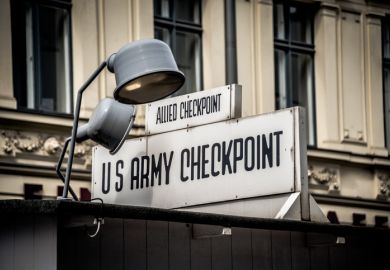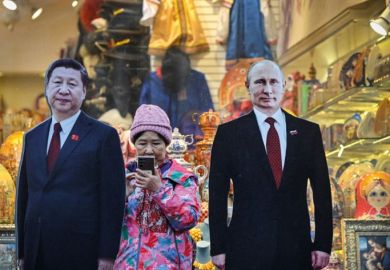John Sturrock was in his early twenties when he stood on the precipice of history at the height of the Cold War, four decades ago.
Mr Sturrock, the president of the student association at the University of Edinburgh in the early 1980s, got to know Michael Westcott, a senior administrator at the university. Mr Westcott and military history professor John Erickson would become central to the formation of the “Edinburgh Conversations”, a series of dialogues starting in 1981 between Western and Soviet academics and diplomats that helped facilitate the end of the Cold War.
But there was a catch: these were to be purely academic discussions on topics including arms control, security issues and the environmental impact of nuclear disaster, rather than political conversations aimed at finding solutions to the stalemate. These discussions were an experiment in how the academic community could build relations and foster debate, which could then be relayed to politicians to inform decision-making.
“It’s impossible to overstate how important the conversations were,” said Mr Sturrock, but they were met with scepticism at the time. When The Daily Telegraph in 1983 branded them “controversial”, the university’s then principal, Sir John Burnett, rebutted criticisms, telling the paper: “We believe dialogue can only lead to better understanding.” The mood shifted, and in 1989 The Observer wrote that “these informal discussions were for several years practically the only channel of communication on questions of common security and disarmament between the Soviet Union and the United Kingdom”.
Last month the conversations were celebrated with an event at the University of Edinburgh, featuring Mr Sturrock, who went on to become a leading mediator in his own right and a KC, and Col. Fred Clark Boli, the US Department of Defense representative at the dialogues.
Professor Erickson, who spoke fluent Russian and died in 2002, was the brainchild behind the conversations, and insisted that they would follow “academic rules”: these would be informal discussions held on sofas with evening social events, with the aim of building communication and nurturing debate.
Mr Sturrock, who described himself as a “fly on the wall to the conversations” at the 1986 edition as an assistant to Mr Westcott, who acted as secretary, said that this atmosphere meant the Western and Soviet representatives “were removed from the political and ideological straitjackets in which so many of these conversations would customarily take place”.
And it was precisely Professor Erickson’s academic background that enabled the building of this bridge between the West and the Soviets, offering a neutrality not afforded to politicians. Niall Gray, a researcher at the universities of Strathclyde and Glasgow who is completing a PhD in Scotland’s role in the Cold War, said that Professor Erickson’s work on the role of the USSR in bringing about the end of the Second World War meant he was “very well respected in Moscow”.
“[The Soviets] often thought that when historians and political scientists wrote about them in the West they weren’t getting a fair deal. But they thought Erickson was actually promoting the fact that they played a pivotal role in bringing about the Allies’ victory in the Second World War, and he used this goodwill to build up a network,” Mr Gray said.
While the global hope following the final conversations held in 1989, amid the fall of the Berlin Wall and symbolic end of the Cold War, may have all but deteriorated following Russia’s invasion of Ukraine and renewed tensions in the Middle East, Mr Sturrock insisted that the world could learn from the conversations about the potential of academic partnerships and communication.
“Throughout history, there are illustrations of the importance of talking, even if those who we perceive to be the enemy are behaving in egregious ways. There’s a crying need for communication and talking about the current issues, whether it be Gaza, Ukraine or Sudan, and it’s a tragedy that the world seems to be experiencing multiple failures of communication,” Mr Sturrock said.
Academia “is often criticised for being very abstract”, Mr Gray added, but it was that “abstraction” that facilitated the success of the conversations – something universities should take stock of now when considering their global position. The aim of academia, he said, was to create a “mutual understanding”, which offers policymakers space to explore options in less politically motivated environments.
“When diplomats are looking for advice, probably one of the best places they can turn to is academia, where people will have their own research,” Mr Gray said. “Of course, it’s always difficult to reconcile the needs of the state and academia because oftentimes they have different goals. Academia aims towards mutual understanding, but of course you have the practical concerns of a state, and the question is how do you try and maximise that?”
The Edinburgh Conversations played a “small but meaningful” role in the end of the Cold War, “and that was done, most of all, through encouraging mutual personal understanding outside of the state and its institutional needs”.
POSTSCRIPT:
Print headline: ‘There’s a crying need for talking’
Register to continue
Why register?
- Registration is free and only takes a moment
- Once registered, you can read 3 articles a month
- Sign up for our newsletter
Subscribe
Or subscribe for unlimited access to:
- Unlimited access to news, views, insights & reviews
- Digital editions
- Digital access to THE’s university and college rankings analysis
Already registered or a current subscriber?








